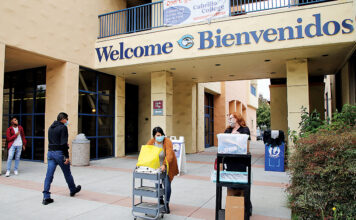WATSONVILLE—Governor Gavin Newsom on the final day of action for the 2019 legislative season signed Assembly Bill 1783, also known as the Farmworker Housing Act of 2019, which creates a streamlined process to build farmworker housing on agricultural land.
The bill was authored by Assemblymember Robert Rivas, who oversees Pajaro Valley as the representative of the 30th Assembly District. It brings the construction of family-friendly, employee housing into ministerial review, an objective approval process instead of the lengthy, subjective procedure that typically bogs down development at the local level. If a farmer meets a short checklist—they must have nonprofit management, no barrack-style housing, projects capped at 36 units—construction could be expedited.
Under that law, housing will be built on surplus agricultural land identified by local governments, now a required action after Newsom also signed a trio of laws (AB 1255, AB 1486 and Senate Bill 6) earlier this month which demand that municipalities report surplus land well-suited for housing developments.
“This is a momentous victory for farmworkers who, together with our family farmers, work to bring the freshest produce to market and help feed the entire country,” Rivas said in a press release. “I thank Gov. Newsom for standing up for the needs of farmworkers and their families. This historic new law helps both farmworkers and farmers by addressing the tremendous need for construction of farmworker housing throughout California.”
Other housing bills also signed by Gov. Newsom that could affect the Pajaro Valley:
SB 330 (Senator Nancy Skinner, D-Berkeley)
Called the Housing Crisis Act of 2019, it will accelerate housing production in California by streamlining permitting and approval processes.
It will halt local governments from changing the land use designation or zoning of a property to less intensive use. Municipalities would also not be allowed to impose or enforce a moratorium on housing development.
The City of Watsonville in early July joined The League of California Cities in writing a letter of opposition against the bill, citing its lack of restrictions on parking requirements of developments near rail stops, and its one-size-fits-all view on housing projects, which would force cities to make judgments and determine fees in no more than 30 days after a “preliminary” application is submitted.
Those applications contain “too little information for a city to determine the scope of the project,” the letter read.
The bill will remain in effect until Jan. 1, 2025.
AB 1763 (Assemblymember David Chiu, D-San Francisco)
Will give 100 percent of affordable housing developments an enhanced density bonus to encourage taller and denser developments.
Current state law allows for a 35 percent increase in density for projects that contain at least 20 percent affordable units. AB 1763 would allow the 100 percent affordable projects to receive an 80 percent increase in density and request up to four incentives and concessions from local governments such as tax breaks, grants and low financing.
AB 68 (Assemblymember Philip Ting, D-San Francisco)
Reduces the barriers limiting the development of accessory dwelling units (ADUs) to boost the state’s affordable housing supply.
The law effectively rezones all single-family homes in the state into “triplexes” to spur the development of ADUs, also known as “Granny flats.”
AB 881 (Assemblymember Richard Bloom, D-Santa Monica) and SB 13 (Senator Bob Wieckowski, D-Fremont) provides additional incentives for ADU development by streamlining permit processes, reducing fees and removing or adjusting rules. One of those rule changes: the owner of a property with an ADU no longer has to live on-site.
“The passage of AB 68, along with SB 13 and AB 881, fundamentally shifts the landscape for building new homes in our state,” said Brian Hanlon, co-founder and president of California YIMBY.
AB 1482 (Chiu)
Prevents landlords from hiking rents more than 5 percent, plus location inflation, in one year and requires landlords to show “just cause” when evicting tenants.
Only rentals that are at least 15 years old will be covered under the law, which applies mostly to apartments and other multi-family buildings.
Condos and single-family homes are exempt unless they are owned by a corporation or real estate investment trust. Duplexes in which the owner lives in one of the units would also not be covered.
For a full list of all bills signed by Gov. Newsom visit www.gov.ca.gov.











